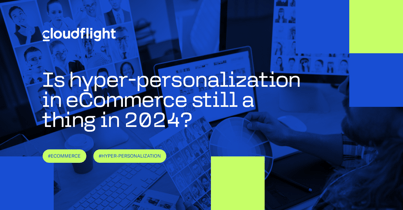The rapid rise of technology has led to the emergence of a new term in the eCommerce industry: phygital. Phygital is the integration of physical and digital elements that provide customers with a seamless, omnichannel shopping experience.
By combining the best aspects of online and offline retail, businesses can better engage their customers and create more meaningful relationships. This article will discuss what phygital is, its advantages for eCommerce companies, and how it can enhance customer experiences.
What is phygital?
Phygital, also called phygitality, is an innovative concept that integrates physical and digital experiences to bridge the gap between online and offline commerce. It combines elements of physical stores and digital platforms to create interactive customer experiences that emphasize convenience and personalization.
Phygital solutions often use augmented reality (AR), virtual reality (VR), artificial intelligence (AI), beacons, QR codes, and NFC tags to enable customers to engage with products in more engaging ways than traditional shopping methods. This merging of physical and digital can improve customer engagement by providing contextual information, promotions, personalized recommendations, or enabling virtual product trials.
Phygital strategies also allow retailers to bridge the gap between their online and offline shops by offering easy access to a broader range of products. For instance, they can display goods in stores while allowing customers to purchase them directly from their eCommerce website or mobile app. Plus, phygital solutions can promote loyalty initiatives by providing customers with instant rewards or exclusive offers for using a specific service or buying certain products.
However, eCommerce retailers should be careful. According to Jack Underwood, Co-founder & CEO of Circuit, "Phygital shopping experiences have the power to negatively impact eCommerce retailers plagued by supply chain issues. With ‘Buy Now, Pickup in Store’ options, retailers have the advantage of local in-store stock that can be ready almost instantly post-order.
“eCommerce retailers can still offer a more convenient experience if they can quickly get their products into their shoppers' hands. eCommerce retailers with problematic or slow supply chains must work to amend the situation before phygital options come for their market share."
Advantages of phygital for eCommerce companies
There are several advantages that eCommerce companies can gain from using phygital solutions. Here are the top four.
Improving customer experience
Phygital solutions, which combine physical and digital elements, can be leveraged to help businesses improve customer engagement by creating an enhanced experience. By introducing digital technologies into physical spaces, customers can access a broader range of services and receive elevated service levels.
For example, customers may use augmented reality or virtual reality displays to take advantage of interactive product presentations or receive real-time updates on their orders. In addition, utilizing these technologies allows businesses to provide a more personalized and engaging experience for customers across different channels, such as in-store visits, online shopping, and phone conversations.
According to Maximilian Wühr, CGO & Co-founder of FINN, "Phygital experiences have the power to transform eCommerce and keep the mighty retail store relevant. AR and VR enhance marketing and allow traditional retailers to elevate in-store experiences by live-streaming in-store shopping events or creating interactive mobile programs.
“Phygital is elevating traditional retailers and giving shoppers the best of both worlds, which means strictly eCommerce brands need to innovate their own experiences to maintain a competitive advantage. Modern consumers are browsing multiple channels to meet their purchasing needs, so the best approach for retail is to deepen your presence everywhere."
Improving internal processes
In addition to providing a more enjoyable experience for customers, phygital solutions can also improve internal processes for businesses. By integrating physical data with digital insights from multiple sources, companies can make more informed decisions faster than ever.
This could lead to increased productivity with fewer mistakes and greater efficiency in daily tasks, such as inventory management and order fulfillment. It can also enable businesses to gain better insights into customer behavior with real-time analytics tools to tailor their customer journey accordingly.
Bridging the gap between online and offline shops
Phygital solutions can help businesses bridge the gap between online and offline shops in various ways. By leveraging technology, companies can create an interconnected experience that enables customers to go seamlessly between their physical and digital stores. For example, shoppers can purchase products online and pick them up in a store or place orders in-store and have them delivered to their homes.
This integrated approach ensures customers always get what they need from the business conveniently without compromising on price or quality. Additionally, with phygital solutions, companies can use data collected from online and offline purchases to gain valuable insights about customer preferences, allowing them to tailor their services accordingly.
Businesses can also improve customer engagement through phygital solutions by offering personalized experiences that blend the best features of both channels. For instance, a customer could receive discounts with a coupon code on specific products by typing in certain keywords or phrases into the chatbot.
Phygital solutions could also incorporate AR into marketing campaigns so customers feel more connected to the product they are considering purchasing. This creates an immersive shopping experience that encourages shoppers to explore items in more detail while still being able to access all the information they need immediately.
Promoting loyalty initiatives
Phygital solutions, or the combination of physical and digital experiences, can help businesses promote loyalty initiatives in various ways. For example, offering customers a cohesive experience across different touchpoints can encourage them to return consistently and make higher-value purchases.
For example, companies can use phygital solutions to create personalized customer experiences. Retailers can use data collected from customers' purchase histories to identify preferences and suggest items tailored to their interests. This creates more engaging experiences for shoppers and encourages them to return and buy more frequently.
In addition, businesses can use phygital solutions to reward regular customers with exclusive discounts or rewards points for online or in-store purchases. This motivates customers to come back more often and helps foster loyalty over time. Companies could even offer free shipping if a customer makes multiple purchases within a certain period as an incentive to keep shopping with them.
Examples of how to use phygital in eCommerce
Now that we've discussed how phygital solutions can benefit eCommerce businesses, let's look at some more specific examples of how they can be used.
Digital signage and kiosks
Digital signage and kiosks are powerful phygital solutions that can create a cohesive customer experience across different touchpoints. For example, retailers can use digital signage to display product information and promotions in-store and provide customers with access to online shopping catalogs. Similarly, they can use kiosks to provide customers with additional product information and allow them to purchase directly from the store.
AR shopping experiences
AR is another effective phygital solution that can create unique shopping experiences for customers. For instance, retailers can use AR to allow customers to virtually try on clothes and accessories or explore products in more detail before purchasing them. This helps create a more immersive shopping experience that encourages customers to explore items in more detail and make more informed decisions.
Mobile apps and loyalty programs
Finally, businesses can use mobile apps and loyalty programs to create a cohesive phygital experience for their customers. Mobile apps can help customers find items in-store, access product information and reviews, or even make purchases directly from the app. Loyalty programs, meanwhile, can be used to reward customers for making purchases and encourage them to come back more frequently.
Benefits of implementing phygital strategies for customers
Implementing phygital strategies for customers can offer a wide range of benefits. For starters, it allows companies to provide customers with an enhanced and more cohesive experience when shopping online and in-store.
Personalized experience
Adopting phygital strategies can also enable businesses to strengthen their customer relationships by providing seamless omnichannel services that help build trust and loyalty. Customers can shop quickly and conveniently while receiving personalized support and advice from in-store staff members.
Fast and automated shopping process
On top of that, implementing phygital strategies boosts efficiency in operations since companies no longer have to rely on manual processing or outdated technology for managing their physical stores. This significantly reduces costs associated with store maintenance, enabling companies to save money. In addition, customers benefit from the increased availability of products as they can now easily compare prices between physical and online stores.
Adapting to customers’ preferences
Not only that, but using phygital strategies also allows businesses to collect data on customer behavior more accurately and gain valuable insights into how customers interact with both physical and digital channels. This helps companies make better decisions, such as tweaking product lines or setting up promotions based on customer preferences, which can improve customer satisfaction.
Overall, it’s clear that phygital strategies offer numerous advantages for businesses and customers alike. Companies can reap the rewards of enhanced operations efficiency while providing customers with a convenient in-store and online shopping experience that meets their individual needs at every step of the process.
Challenges faced by businesses when implementing phygital initiatives
One of the significant challenges businesses face when implementing phygital strategies is the complexity of integrating online and offline operations. With digital transformation becoming increasingly important, companies are expected to go beyond simply providing customers with an online presence.
Instead, it requires a comprehensive approach that involves unifying digital and physical processes, products, services, and experiences to provide customers with a seamless experience across multiple touchpoints.
Another challenge for businesses when implementing phygital strategies is developing new skill sets. Businesses have traditionally focused on digital or physical operations, so introducing both can be difficult from a capabilities perspective. Because of that, companies must train employees to manage digital and physical operations effectively while ensuring they’re always up-to-date with the latest technology and trends within the industry.
Some companies may find it hard to adjust to shifting customer preferences and behaviors when transitioning into a more phygital approach. Traditional customer segmentation models may no longer work due to changes in behavior caused by mobile devices or new technologies such as AI. Correspondingly, businesses must be able to understand customer needs while tracking their journey through all touchpoints to deliver a personalized experience for their phygital strategy to be successful.
Final thoughts
Using phygital strategies has a wide range of benefits for both businesses and customers. However, it’s also essential to consider the numerous challenges associated with implementing these strategies, including the complexity of integrating online and offline operations and the need for businesses to develop new skill sets and adjust to shifting customer behavior.
By considering all of these factors, businesses can ensure they leverage the advantages of phygital strategies to remain competitive in today's digital landscape.
Published February 7, 2023











